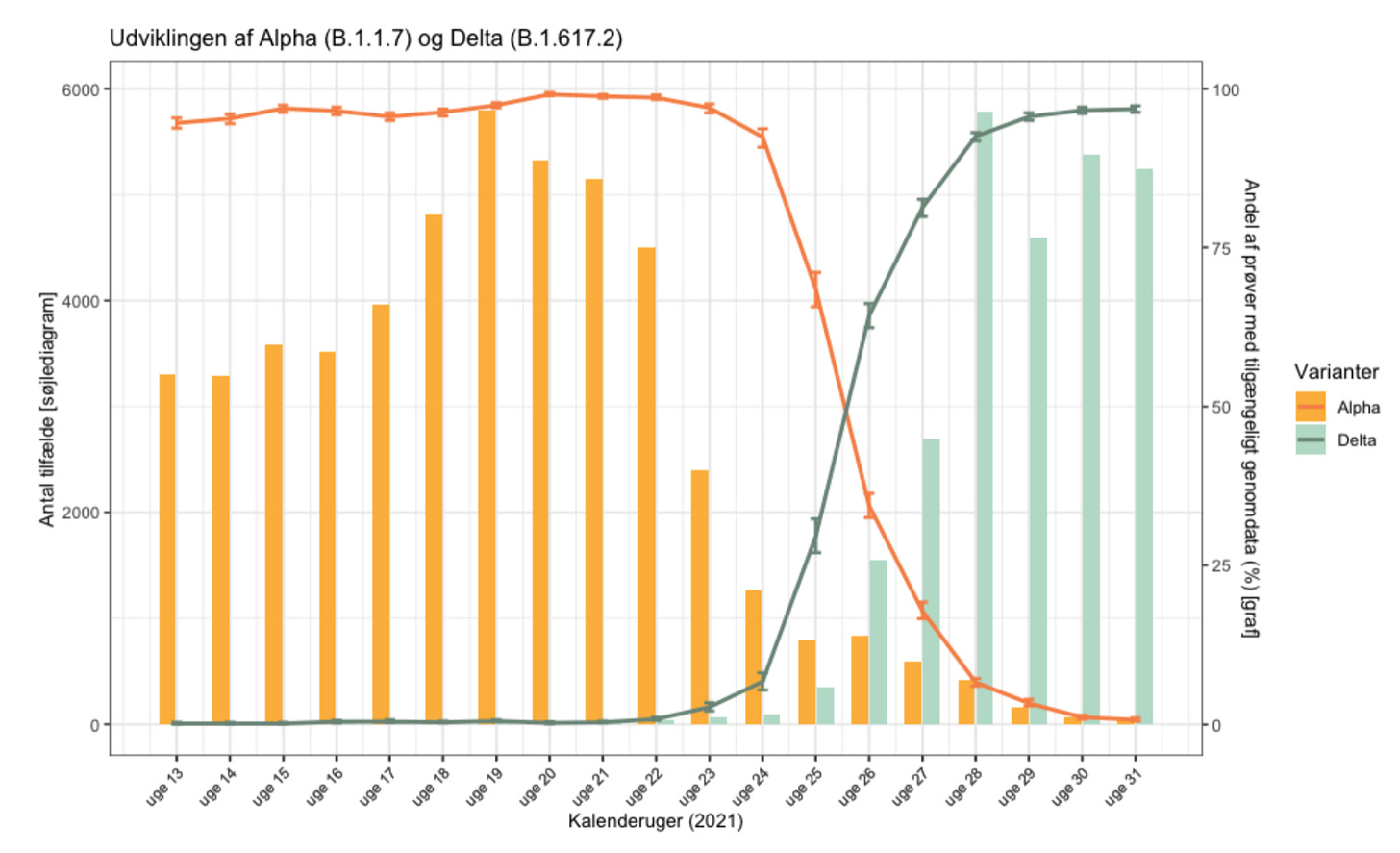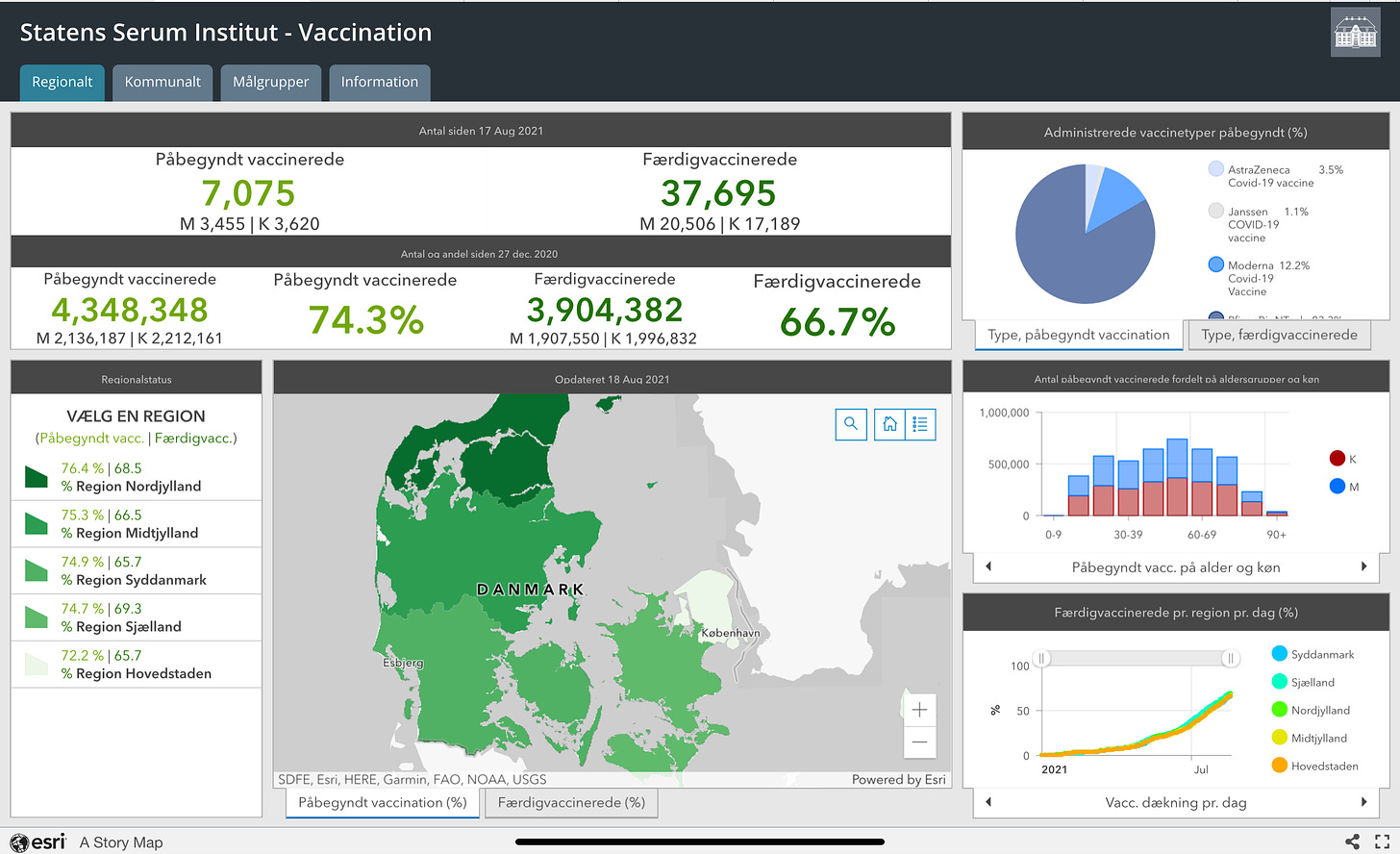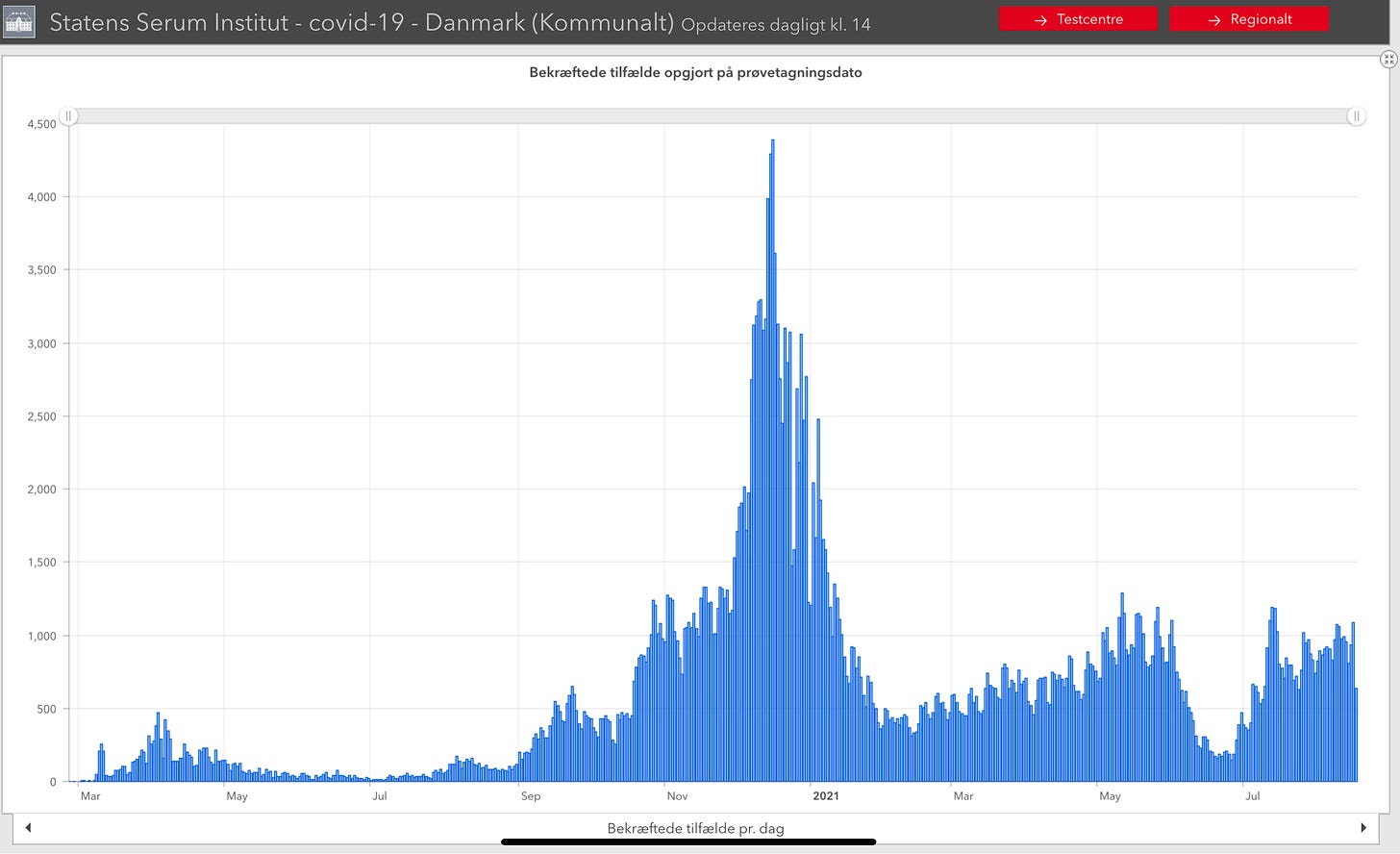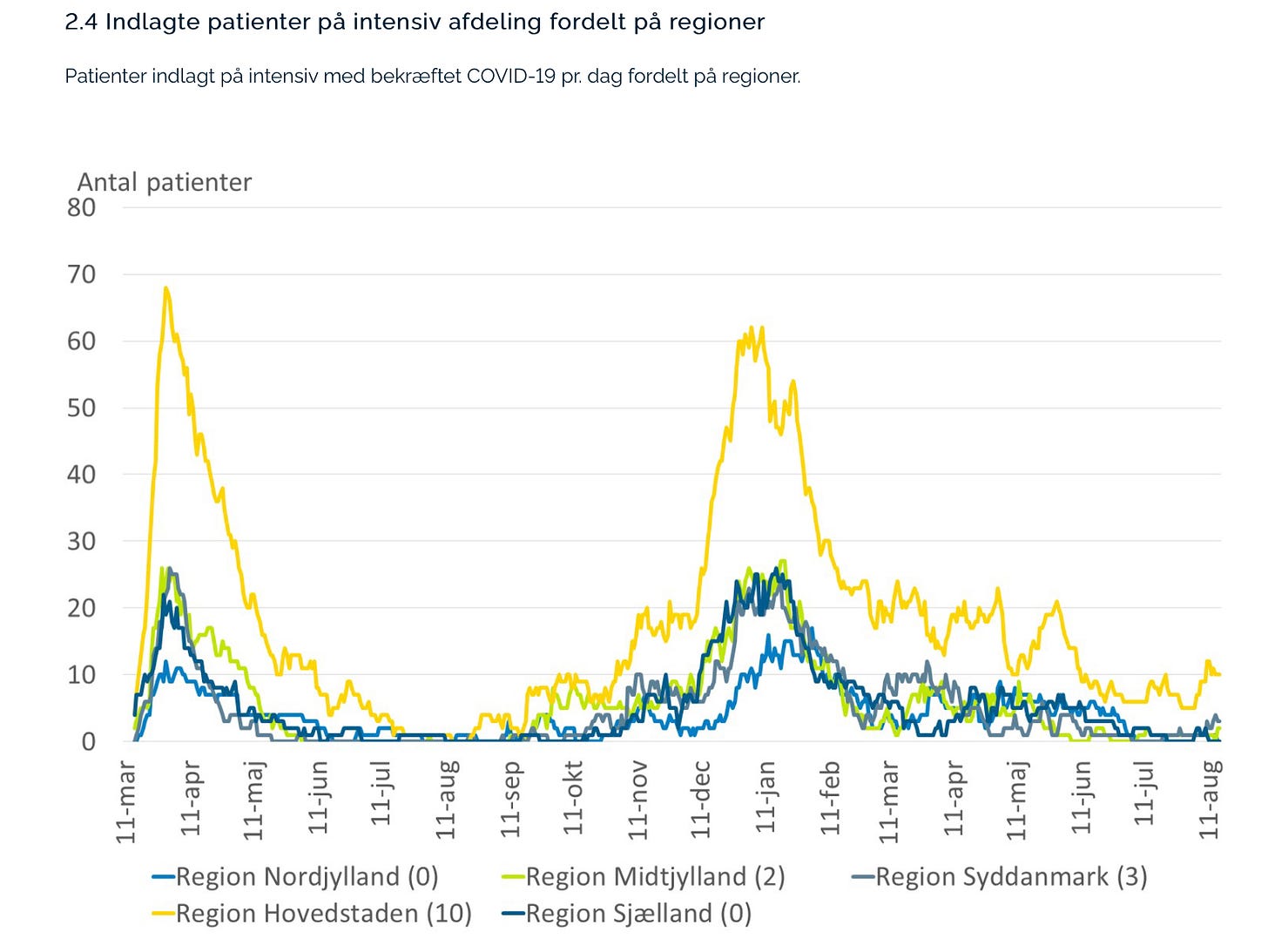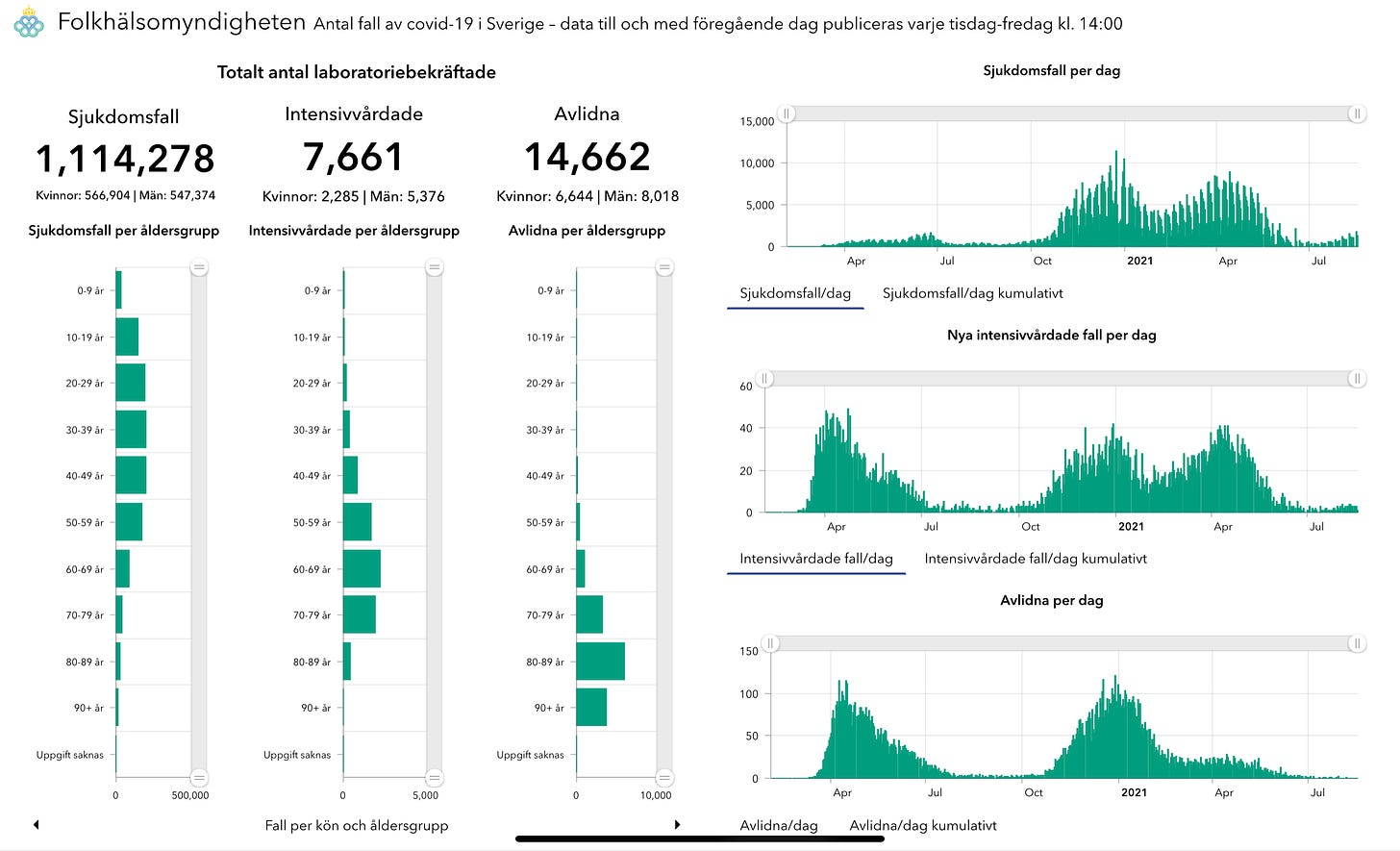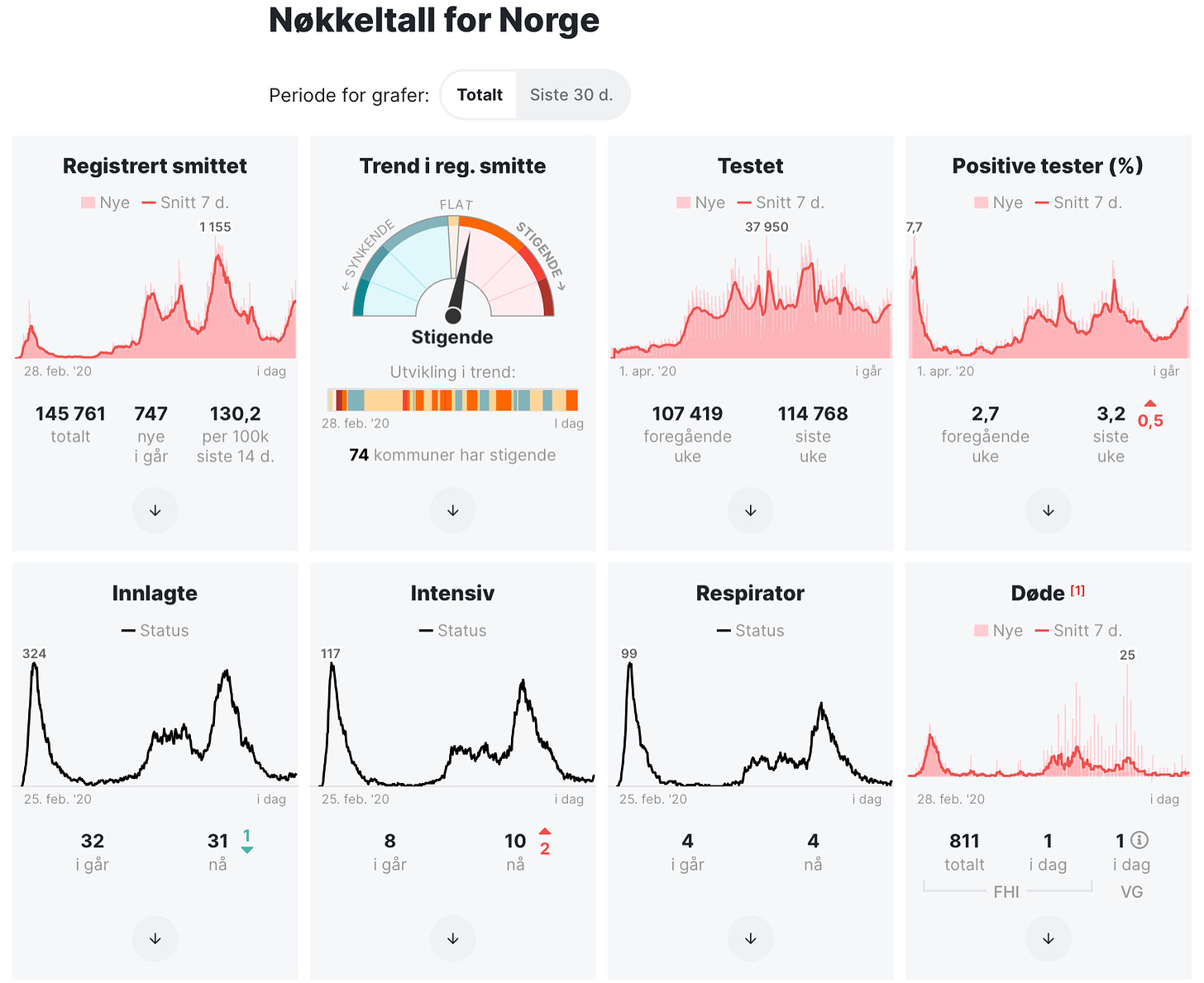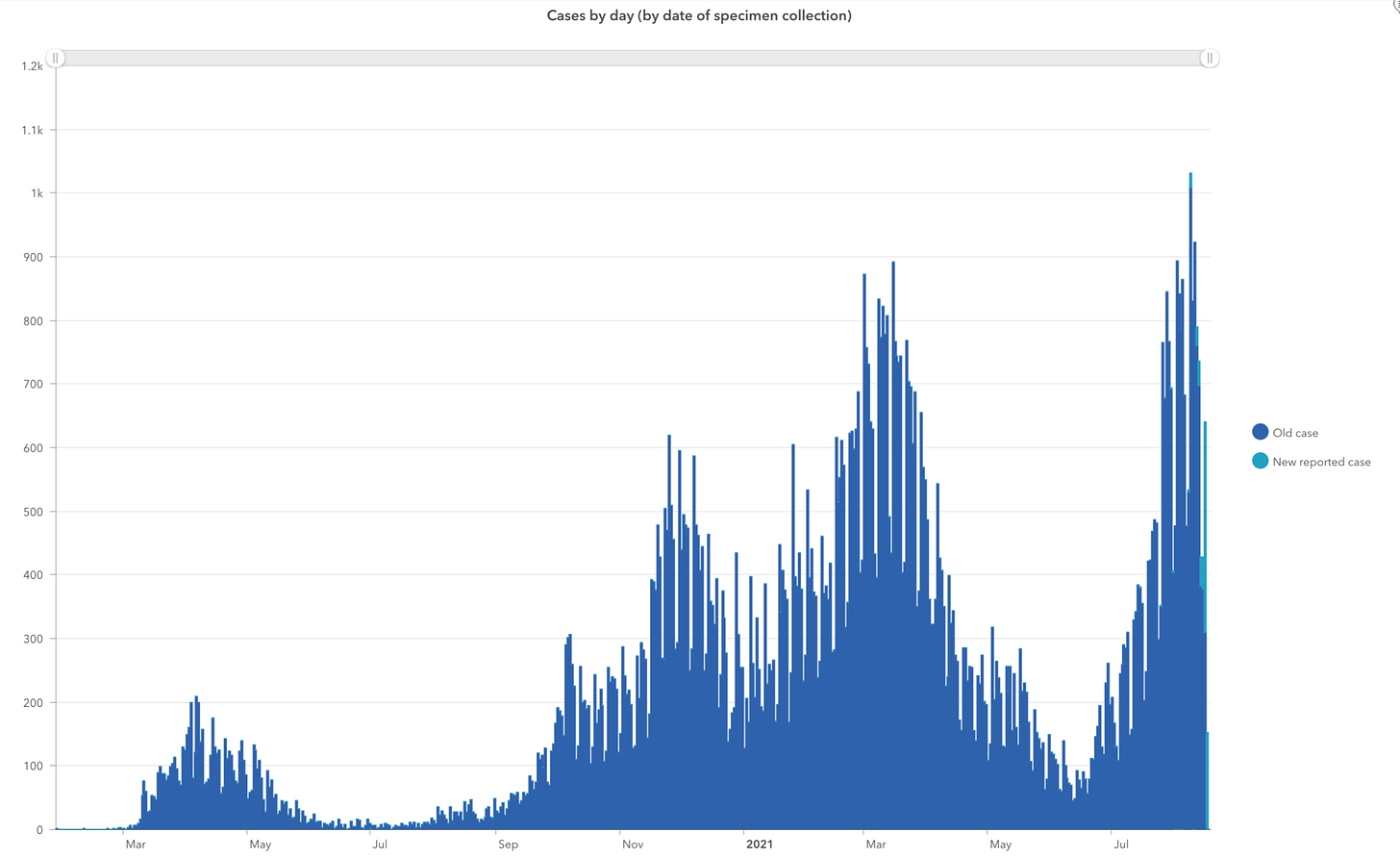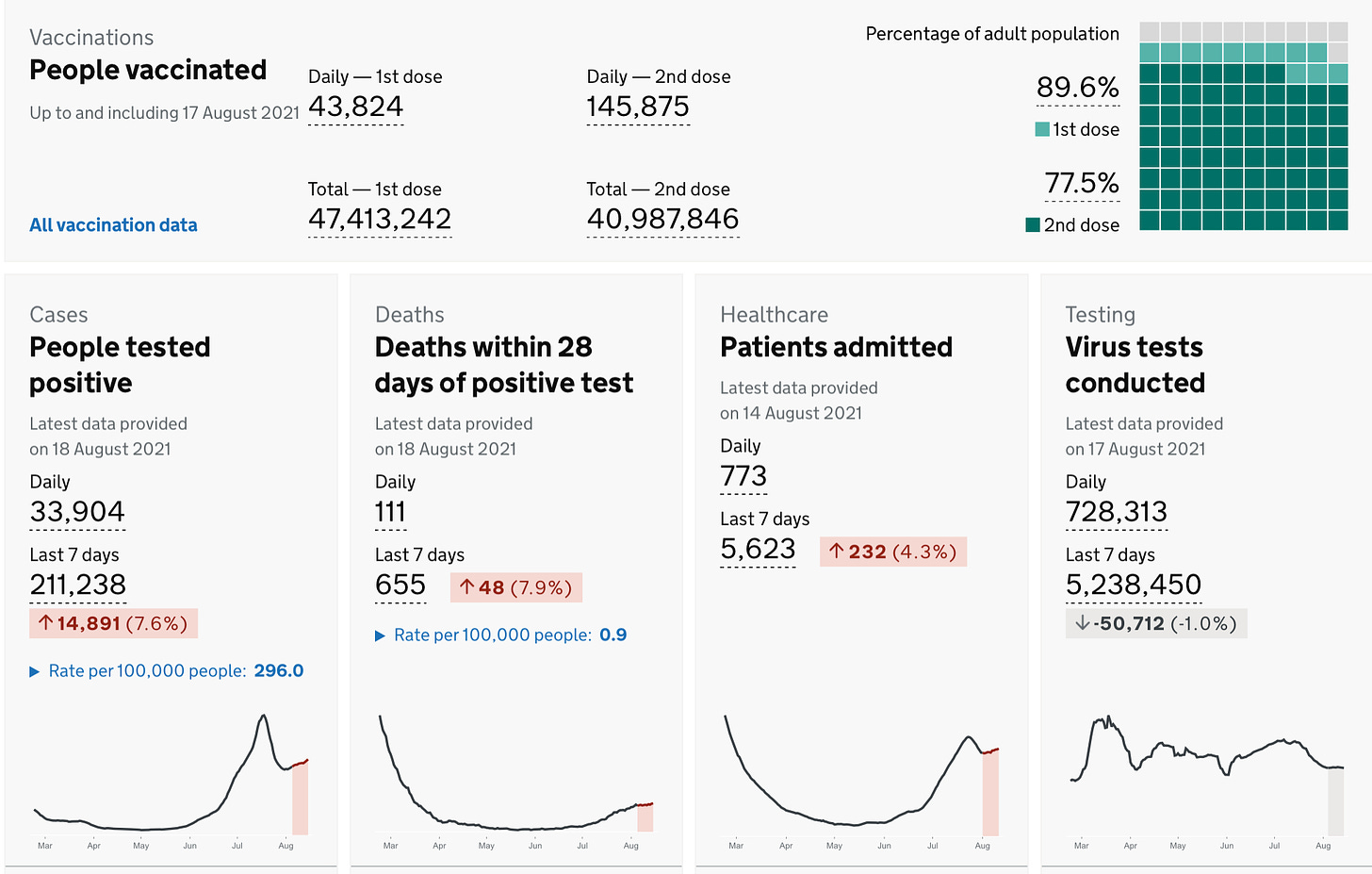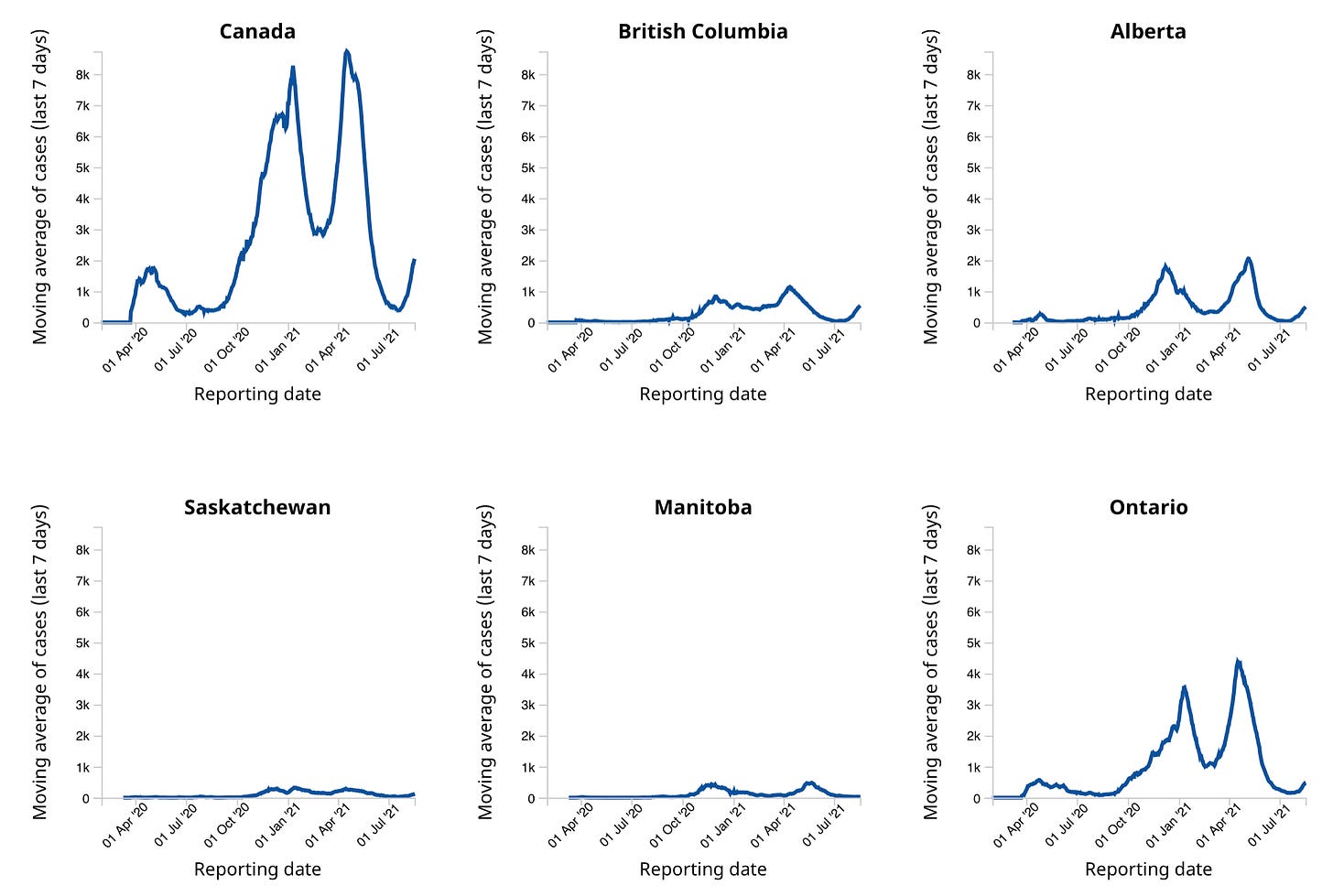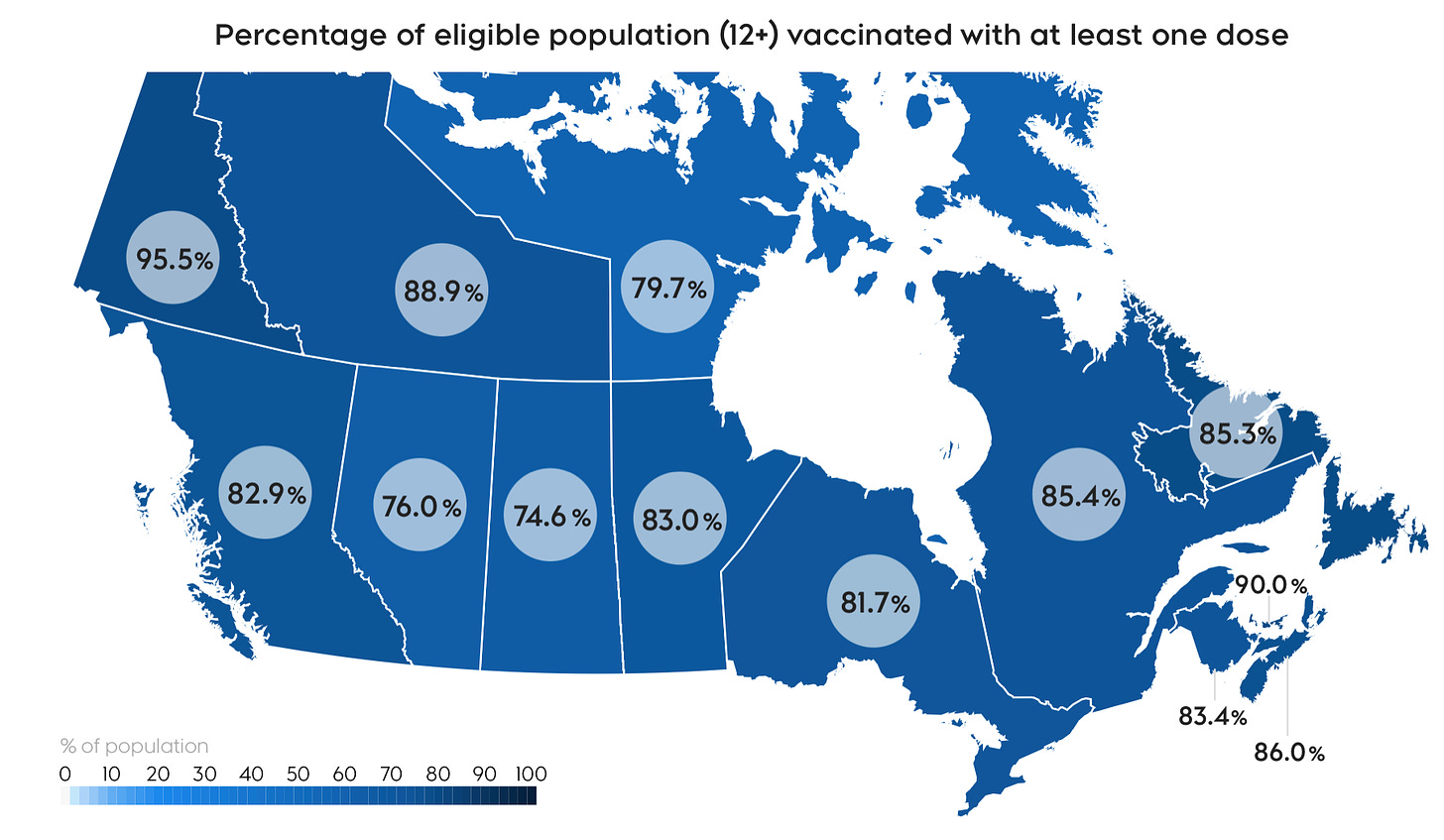The Evening Report - Aug 18
Danish study finds high vaccine efficacy even against the Delta variant
🇩🇰
For a second straight week, the Delta variant has been so dominant in Denmark, not a single case of any other variant has been reported. The Staten Serum Institut’s latest variant update says another 4,394 Delta variant cases have been confirmed in the last week, pushing the to-date total number of cases to 27,705.
As you can see in the chart below Delta has rocketed up to heights where it accounts for almost every new COVID case in the country in the last week. In doing so, it has all but eradicated the Alpha variant.
-
Denmark’s Staten Serum Institut has determined that the vaccines in use in Denmark provide very high protection against hospitalization even with variant infections. The institut studied 2,097 infection cases among fully vaccinated people, or breakthrough infections, over several months when the Delta variant had become dominant. Of those, 57 who were infected with the Alpha variant had to be hospitalized, another 33 who had the Delta variant were also admitted.
The SSI has calculated that the vaccines have a high level of protection against hospitalization from the Alpha variant (B.1.1.7). It found the Pfizer vaccine offered 86% protection while Moderna was higher at 97%. For the Delta variant Pfizer offers 94% protection and Moderna has 97%.
As for providing a shield against Alpha variant infections overall, the institut analysis found Pfizer came in at 81%, Moderna at 96%, and AstraZeneca 74% using PCR testing. As for protecting against Delta variant infections, the efficacy rates were slightly lower with Pfizer offering 79% protection, Moderna 88%, and AstraZeneca came in at 74%.
The SSI notes these real-world results come in at slightly lower rates than what was found in clinical trials, which were used in approving the vaccines for use in Europe.
Acting Professional Director Tyra Grove Krause:
“In these preliminary analyzes, we see that the vaccines provide a fairly high level of protection against being infected with both the Alpha and Delta variants. At the same time, the analysis shows that the protection against being admitted to hospital is even better. Even though the vaccines protect really well against serious illness, you can still be infected even if you have been vaccinated. Therefore, it is important to be tested with a PCR test if you get symptoms or are in close contact with someone who is infected. Even if you have both doses.”
-
On the vaccination front to date, enough 1st doses have been administered to cover 74.3% of the population while 66.7% are now fully vaccinated.
Yesterday there were just 44,770 total inoculations done, of which 7,075 were first doses.
-
While other nations have either mandated healthcare staff be vaccinated or are moving in that direction in order to compel vaccinations, in Denmark, this isn’t even remotely an issue. Figures from the Staten Serum Institut show the vast majority of Danish health care workers have been vaccinated. 99% of hospital and nursing home staff have one dose and in nursing homes 98.6% have both doses, for hospital staff it is 98.3%.
FOA Trade Union Sector Chair Torben Hollmann:
“We had hoped that the figure was slightly above the national average, but with these figures I think that FOA's members deserve a gold medal. In the beginning, there were few who said they refused the vaccine, and they were the subject of much criticism. But the reality is that the staff has taken responsibility by receiving the vaccine and thus protecting both themselves and the elderly, and vulnerable.”
Its not just healthcare staff, the Danish kommunes report that 96.3% of seniors in nursing homes have one dose and 94.8% are fully vaccinated.
-
Denmark is reporting 1,193 COVID infections and no new coronavirus deaths in the last day.
Yesterday there were 160,450 total corona tests done, 74,424 PCR and 86,026 rapid, for a (PCR only) positivity percentage of 1.60%.
-
COVID hospitalizations (105) have edged upward (+4) while the number of infected people in an ICU (16) also crept up (+1) and of those the number on a ventilator (7) dipped slightly (-1).
-
The Danish National Health Board has now updated its guidelines for close contacts reducing the definition of a close contact to anyone within one-meter of an infected person for 15 minutes or longer.
Deputy Director of the National Board of Health Helene Probst:
“We know that the vaccine protects well against being infected with the Delta variant and against having a serious case of COVID.Therefore, we can adjust the guidelines for contact tracking so that they become a little less intrusive in everyone’s everyday life.”
The change also means people who have been close to someone deemed to be a close contact of an infected also no longer need to be tested.
Who is a close contact?
You live with an infected person
You have had direct physical contact, for example hugging an infected person, or someone with COVID has coughed or sneezed on you
You have been closer than 1 meter to an infected person for more than 15 minutes, for example if you have been in a conversation with the person
What do you do if you are a close contact of an infected person?
If You have not been fully vaccinated: You must immediately go into self-isolation and be tested on day 4 and 6 after you were last in close contact with the infected person.
You have been vaccinated or previously infected within the last 12 months. You do not have to go into self-isolation. Get tested on day 4 and 6 after you were last in contact.
Close contacts that test positive for, or develop symptoms of, COVID should immediately enter or maintain self-isolation.
🇸🇪
Sweden has added 1,320 infections and three more corona deaths since yesterday’s update.
To date, 6,589,191 1st doses (80.5% of the adult population over the age of 18) and 5,003,350 2nd vaccine doses (61.1%) have now been administered.
-
Infections continue to mount in Sweden’s capital region. With 2,177 new COVID infections last week, Region Stockholm has seen a 20.% increase in corona case numbers from one week to the next. There are currently 62 people in one of the region’s hospitals, an increase of five from the week prior, and the capital region didn’t see any new deaths last week.
Infection Control Physician Maria Rotzén Östlund:
“Now a new school year begins at the same time as many are returning from holidays. We know that just over 40-percent of the county's residents have not yet had both of their vaccine doses. This means that we must all continue to follow the recommendations, regardless of whether we are vaccinated or not, in order to reduce the risk of continued infection spread.”
Östlund says the most important health recommendations are to stay home if you have symptoms, get tested, and keep your distance from others as much as possible.
The region continues to caution that a reporting lag continues in Sweden and sequencing positive test results continue to be very backlogged, being two to three weeks behind.
-
Sweden’s Public Health Agency has done a fourth survey to assess any negative consequences of the pandemic throughout the overall health care system. The first survey in May of 2020 found COVID fears and overall strain on the healthcare system had been a deterrent for people seeking other medical care. The latest results show concern has decreased across all age groups but was highest among seniors, the highest vaccinated age group.
Agency Investigator Karin Guldbrandsson:
“Both anxiety and fewer care visits can have a negative effect on public health, especially based maintaining the goal of equality in health. Older people in particular should be encouraged to seek care when needed and not to cancel planned visits without first discussing with the health service. Therefore, it is positive that the proportion of older people who state that they have avoided seeking care has decreased by 14 percentage points between May 2020 and May 2021.”
-
Vaccination times are wide open in Southern Sweden’s Skåne region. Newspaper Sydsvenskan reports vaccination clinics in the region are swimming in available bookings, with the number of openings doubling since mid-July. The vaccination demand has ebbed to such a point that some contractors are now reducing operating hours. This despite some 230,000 people over the age of 16 in the region who have yet to begin the vaccination process.
🇳🇴
Norway has added 361 infections and one more corona death since yesterday’s update.
COVID hospitalizations (31) are down (-1) ICU numbers (10) crept up (+2) and ventilator numbers (4) are unchanged.
To date, 70.3% of Norwegians have had one vaccine dose and 42.59% have had both.
-
Norway has given the green-light to begin vaccinating 16 and 17-year-olds. This is based on a recommendation from the Norwegian Institute for Public Health, who reviewed vaccination efforts in other countries and all “available knowledge.”
Chief Physician Margrethe Greve-Isdahl:
“Few young people have become seriously ill from the coronavirus, but there is some infection among 16-17-year-olds. Vaccination will help protect the few who can become seriously ill if they become infected, in addition to reducing the spread of infection in society.”
The opportunity to get vaccinated in Norway is now open to everyone born in 2004 and 2005, a group health officials estimate to be about 127,000 people. The health institute says anyone over the age of 16 can decide for themselves to get vaccinated while anyone younger must have the consent of their parents.
The NIPH says data from Norway and other countries shows that the infection risk is far higher for those 16 to 19-years-old than for younger children.
The institute is recommending an interval of between eight to twelve weeks between first and second doses for the teens. It says there’s some concern about a rare side effect causing an inflammation of the heart muscle, called myocarditis. While very rare, the condition occurs more frequently in younger age groups, in the U.S. the incidence was about seven per 100,000 among adolescents. A longer interval between doses might help to buy time to gather more knowledge about the side effect before a second dose.
“Recent research shows that this is a condition that can occur after vaccination in some, and where most people recover within a month. We have also obtained advice from cardiologists who believe that this rare side effect should not prevent young people from being offered a vaccine. COVID in adolescents can have a more serious effect on the heart than myocarditis after vaccination.”
The National Institute of Public Health continues to study the possibility of vaccinating 12-15-year-olds. A decision could come in a few weeks.
-
Norway is encouraging women who are planning to have children and those who are pregnant and breastfeeding to get vaccinated. The Norwegian Institute for Public Health says new studies show that pregnant women have a higher risk of severe cases of COVID should they get infected. Many countries have been vaccinating pregnant women for months in Denmark, Sweden, Canada, USA, and the United Kingdom, among others. None have reported any issues or additional side effects.
Chief Physician Margrethe Greve-Isdahl:
“Data from countries where pregnant women have been vaccinated show that COVID vaccines do not have an adverse effect on the course of pregnancy for either the mother or the child in the womb. The World Health Organization (WHO) recommends that pregnant women be given vaccination priority and more and more countries have started vaccinating pregnant women.
Greve-Isdahl says the later the pregnancy the higher the COVID risk.
“The risk for the pregnant woman increases throughout the pregnancy. We therefore recommend pregnant women who are in the 2nd and 3rd trimester vaccination with mRNA vaccine against coronavirus. Pregnant women who belong to a risk group for COVID can also be vaccinated from the first trimester.”
Another benefit of being vaccinated before or during pregnancy is that, according to the health institute mothers will pass the antibodies on to their children.
The NIPH says unless there is an underlying health condition, they tend not to vaccinate women who are in their first trimester.
🇫🇮
Finland has registered 673 corona infections since yesterday’s update.
In the last week there have been another 13 virus deaths.
COVID hospitalizations (106) are up slightly day to day (+2) while ICU numbers (29) are down (-2).
To date, 3,876,306 1st vaccine doses (69.3% of the population) and 2,423,533 2nd doses (43.5%) have been administered.
-
The Finnish Institute for Health says about 50,000 of the country’s roughly 250,000 adolescents between the ages of 12 and 15-years-old have now had their first vaccine dose. In the regions of Vantaa and Espoo, around 60.% of adolescents have had their first shot. In Helsinki, first doses have been administered to about half of eligible children.
Finnish news outlet YLE reports an effort by health officials to run pop-up vaccination sites on school grounds has been very effective. In Vantaa, for example, about two-thirds of 12 to 15-year-olds received their shot in school. Health officials in Vantaa also report that anti-vaccine misinformation campaigns are not having any impact among young people. This might be due in part to school programs focused on online media literacy. That said, police in Helsinki arrested two anti-vaxxers on Friday who tried to disrupt vaccinations at a school in the Finnish capital.
🇬🇧
The United Kingdom is changing self-isolation mandates now that over 75% of the population is fully vaccinated. As of Monday this week, anyone who has both doses or under the age of 18 will no longer have to quarantine if they’ve been in close contact with an infected person. Instead, they should get a PCR test to screen for infection and variant type. If the test is positive, then a person, regardless of vaccination status, is legally required to quarantine.
Testing will be a major part of England’s return to normal for close contacts, students, and even employees, all mandated to undergo varying degrees of regular testing.
Public Health England advises fully vaccinated people in the UK to take precautions like wearing a mask or keeping their distance, especially when in enclosed spaces with unvaccinated or vulnerable people.
The latest data from Public Health England and Cambridge University shows that around 60,000 deaths, 22 million infections, and 66,900 hospitalisations have been prevented by the vaccines.
The UK reported 33,904 coronavirus cases today along with 111 deaths.
The number of infections, fatalities, and hospitalizations have all increased in the last seven days.
-
For the new school year in the UK according to the phase four reopening guidelines, social distancing will no longer be required for children 18 and under. Schools must stagger start and finish times to avoid crowds. All students will be tested twice a week at school in the first week of the return to class. From then on testing will be done at home with testing kits provided by the government. The testing requirements will be reviewed by the end of September.
🇺🇸
The Biden administration in the United States issued a joint statement with health officials today announcing a plan to offer a 3rd booster shot to all Americans. This would come eight months after a person’s second inoculation. Health officials in the States say vaccine efficacy is decreasing over time and the Delta variant is reducing protection. In both cases this is contrary to studies and analysis from European health officials and agencies. The booster shot strategy in the States still requires approval from the Federal Food and Drug Administration.
This means the US will need around 170 million doses for its booster shot campaign, further eating into supply for developing countries whose vaccination efforts are already starved of vaccine doses. The World Health Organization has condemned wealthier nations announcing booster shot campaigns as uninformed and ultimately selfish. The global health agency says wealthier western nations need to seriously step up and help vaccinate the rest of the world instead of eating up almost all of the available doses. It says the world is at risk if a new, even more potent variant or variants pop out of a developing nation because people there weren’t vaccinated.
🇨🇦
On the campaign trail today, Liberal Party leader Justin Trudeau said that all domestic train and air travel in Canada is now open only to fully vaccinated travelers or people who have a medical exemption. No vaccine, no travel. Trudeau added there be no “accommodation” for negative rapid tests.
-
Canada has reported 1,725 new COVID infections and another 15 deaths yesterday as the national infection curve continues its upward surge.
The Canadian vaccination effort has so far administered 27,487,784 1st vaccine doses (72.20% of the population) while 24,418,050 people (64.13%) are fully vaccinated.
In Ontario today, there were 485 new COVID cases, of which 309 cases are in unvaccinated individuals and 41 in partially vaccinated individuals.
Quebec reported 436 and one more death today.
In Atlantic Canada, New Brunswick recorded 16 new infections. Nova Scotia had nine. Newfoundland and Labrador had six.
Manitoba saw 37 infections and no new deaths yesterday.
There were in 107 new infections in Saskatchewan yesterday. Of the new corona cases, 82 (77%) were unvaccinated, 10 (9%) were partially vaccinated and 15 (14%) were fully vaccinated.
Alberta logged 407 new corona cases and three fatalities yesterday. 74% of yesterday’s infection cases were unvaccinated people, 9% had one dose, and 17% were fully vaccinated.
B.C. registered 501 infections and one more corona death yesterday. Hospitalizations continue to rise, with 111 people hospitalized.




